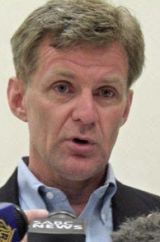UN’s Egeland: Abuja agreement only hope for Darfur
May 15, 2006 (GENEVA) — The Darfur peace deal signed in Abuja last week is the only hope to end the conflict in Sudan’s vast west and if it is not enforced the region will spin out of control, the top U.N. humanitarian official said on Monday.
 “If it is implemented, we (the U.N. and aid agencies) could start planning for recovery and a return home of the more than 2 million refugees,” said Jan Egeland, the U.N. under-secretary for humanitarian affairs.
“If it is implemented, we (the U.N. and aid agencies) could start planning for recovery and a return home of the more than 2 million refugees,” said Jan Egeland, the U.N. under-secretary for humanitarian affairs.
“If it is not, it will mean a downward spiral which will get totally out of control and go into the abyss,” he added.
Egeland visited Sudan last week and encountered the frustration of refugees, some of whom were forced from their homes when the Darfur conflict erupted in early 2003.
His trip to Kalma camp in South Darfur state was cut short after angry refugees attacked a Sudanese man in his convoy, saying he was a member of a feared Janjaweed militia.
The same crowd later killed an African Union interpreter in a surge of violence Egeland said at the time was repeated in camps in other regions as refugees learned the details of the May 5 peace agreement signed in Abuja, Nigeria.
Refugees said it did not ensure their safety and did not represent all the people in Darfur because only one faction had signed the deal with the government.
Egeland called on the two remaining factions to sign and said the agreement was the only hope to end the three year conflict that has killed tens of thousands of people and forced 2 million more to flee their homes.
“I think Abuja is the only hope we have for Darfur,” Egeland told a news conference in Geneva on his way back to New York.
He echoed U.N. Secretary-General Kofi Annan’s call for the international community to be ready to fund a beefed-up operation by African Union (AU) forces in Darfur.
The AU’s Peace and Security Council met on Monday in the Ethiopian capital Addis Ababa to discuss the organisation’s next moves in Darfur. Among other things it was considering giving its 7,000-strong force in the region a stronger role.
Egeland said it was “absolutely essential” that the AU force get a more robust mandate which would allow it to protect the civilian population in Darfur and not just AU peace monitors.
But in order to do this, he said the AU needed more troops and transport equipment, especially helicopters.
Egeland said he hoped a U.N. force of troops from a wide range of countries including Muslim states could be approved and put into operation in place of the AU force by the end of the year. But the Sudanese government has yet to agree to this.
(Reuters)
